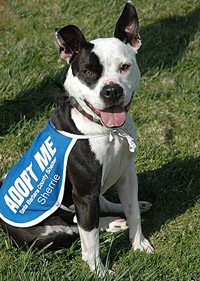National Poison Prevention Week
Know What Is Toxic to Your Pet
National Poison Prevention Week is March 14-20. This awareness week aims to educate the public on how to prevent accidental poisonings. It’s also a great opportunity to make sure that pet owners are well-informed on what can inadvertently poison their pets.
The most common cause of companion animal poisoning is from rodent poisons and insecticides. If possible, it is best to use non-lethal methods of controlling rodents and insects for the safety of your pet. “Have-a-Heart Traps” can be purchased from hardware stores to humanely trap rodents, and then place cotton balls dipped in peppermint oil near problem areas to prevent them from returning. There are also natural alternatives to pesticides. If you have an ant problem, you can sprinkle cinnamon, bay leaves, cayenne pepper, or baby powder in problem areas and along baseboards and windowsills. To prevent cockroach infestations, use equal parts of baking soda and confectioner’s sugar in problem areas. Small sachets of crushed mint placed around the home will discourage flies. So will a potted sweet basil plant. Mosquitoes can be discouraged if you dab lavender oil on your wrists and elbows.
Aside from rodent poisons and insecticides, there are everyday food items that are potentially toxic to your pet. Drinks such as alcoholic beverages can be toxic if ingested. According to the American Society for the Prevention of Cruelty to Animals, because alcohol is rapidly absorbed into the bloodstream, it affects pets quickly. Ingestion of alcohol can cause dangerous drops in blood sugar, blood pressure, and body temperature. Intoxicated animals can experience seizures and respiratory failure. And you may want to skip sharing turkey and chicken with your pets since poultry bones can splinter and cause blockages. Foods containing grapes, raisins, and currants can result in kidney failure in dogs. Chocolate and cocoa contain theobromine, a chemical highly toxic to dogs and cats. Ingestion in small amounts can cause vomiting and diarrhea but large amounts can cause seizures and heart failure. Many sugarless gums and candies contain xylitol, a sweetener that is toxic to dogs. It causes a life-threatening drop in blood sugar and liver failure.
In addition to poisons and food, the Pet Poison Helpline (PPH) urges owners to make sure to pet proof their home. Dr. Ahna Brutlag from PPH believes pet owners can take simple steps, such as making sure the plants in your home are non-toxic or storing your medications in secure areas to significantly reduce the chance that your pet will come in contact with a toxic substance. According to Dr. Brutlag, some common household plants may be toxic to pets, but not people. For example, lilies are especially poisonous to cats. The ingestion of just one or two petals can be fatal to some cats. A list of toxic plants can be found at petpoisonhelpline.com. Always consult this list before buying new plants for your home.
You may be surprised to learn that most bathrooms contain products that can potentially be harmful to animals. Dr. Brutlag warns pet owners to keep medications such as over-the-counter and prescription pills, inhalers, and dietary supplements, safely locked up in secure cupboards. She says to never medicate your pets with human products without first contacting your veterinarian. Some common human medications such as acetaminophen (Tylenol) and ibuprofen (Advil) are extremely poisonous to pets. Dr. Brutlag also advises pet owners to check the container before giving medication to your pet to make sure it’s the correct medication. PPH receives many calls from people who accidentally gave their own medication to a pet.
One product that I was really surprised to find hazardous to pets, is fabric softener sheets. Apparently, these sheets contain detergents known as cationics that are potentially harmful, especially to cats. Furthermore, there are studies that indicate that fabric softener sheets could be harmful to humans as well. I found an interesting alternative to dryer sheets—there’s a safer product called “dryer balls” that work almost as well as dryer sheets and are reusable many times over. You can purchase them at most home goods stores.
If you think your pet has ingested a poisonous substance, the Pet Poison Hotline is a service available 24 hours, seven days a week for pet owners and veterinary professionals that require assistance treating a potentially poisoned pet. PPH can provide treatment advice for poisoning cases of all species, including dogs, cats, birds, small mammals, large animals, and exotic species. As the most cost-effective option for animal poison control care, PPH’s fee of $35 per incident includes follow-up consultation for the duration of the poison case. PPH is available in the U.S. and Canada by calling 800-213-6680. Additional information can be found online at petpoisonhelpline.com.

Adoptable Pet of the Week
This four-year-old, 40 lb., pit bull mix is a perfect combination of lovable and spunky. She’s energetic and goofy, but loves to cuddle, relax, and curl up next to someone special. Sherrie would like to go home with an active family who’ll give her plenty of exercise (run, bike, and hike). She loves other dogs, passed her cat test, and would do well with kids ages seven and up.
To meet Sherrie and all her doggy pals, visit K-9 PALS, 5473 Overpass Rd. For more information, call 681-4369 or visit k-9pals.org.



